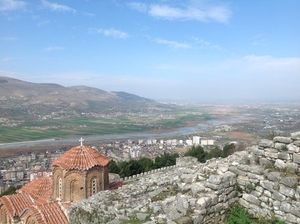History
Although in New Testament times Albania had a flourishing Christian church, it had become part of the Ottoman Turk empire by 1468. Muslim domination continued right up until 1912 when independence was achieved from Turkey.
One of the earliest attempts to re-evangelize the population was made in 1828, when the Bible Society completed the translation of the New Testament into Albanian. After a visit to the country in 1863 Alexander Thomson reported: ‘In all these extensive districts … there is no missionary whatsoever …’ Some years later it was stated that ‘Albania is perhaps … the most backward in the empire as regards civilization and religious instruction. Sunk in deep ignorance and addicted to plunder and violence … if ever Albania is to rise from her degradation … it must be through the agency and power of the Word of God.’ Subsequent Protestant missionary effort was spasmodic and the few colporteurs and believers experienced fierce opposition. In the late 1930s it is recorded that there were spiritual ‘awakenings’ at Korce and Vagia, with American missionaries being involved.
In 1939 Albania came under Italian rule. By 1940, when then the last missionary was forced to leave the country, the only city where there was an evangelical church established was Korce. There were perhaps one hundred believers at that time. The Germans took over the country before the end of the Second World War.
A Communist takeover in 1946 under the leadership of Enver Hoxha saw a new era of intense repression. Hoxha ruled the country with an iron fist. Mosques and churches were forcibly closed and there was vicious persecution of adherents of all religions. Albania declared itself the world’s first ‘atheist state’ in 1967. The tiny Christian church continued to exist in secret.
Hoxha died in 1985 and Albania followed other Eastern European states in shaking off Communism. By 1991 it had become a democracy with an interim constitution guaranteeing religious freedom.
In 1993 there was open ethnic strife between Greeks and Albanians followed by a purge of Greeks from senior positions in the civil service and army. Recently many Albanians have put their life savings into ‘pyramid’ saving schemes which promised high financial returns. When in February 1997 these schemes collapsed there was a violent backlash, with some of the southern population looting arms depots. This has led to unpredictable and ongoing consequences among the now heavily armed population.
The current situation
From 1991 until early 1997 there has been a new period of opportunity for mission but the result has been that all kinds of false teaching have poured in including those of the Mormon and Baha’i cults. Roman Catholic influence has increased in the north and Orthodoxy in the south. Islam too has been seeking to win Albania back into its fold with new mosques being built in many towns and villages. It has even been suggested that the present civil disorder may have been inspired by anti-Islamic influences coming from Greece.
Evangelical influence has grown dramatically since 1991. In five years more than one hundred churches have opened and, before the present troubles, six hundred missionaries were working in Albania. The ‘Christian’ presence ranges from the most closed Brethren to the most extreme charismatic, with the charismatic side predominating.
Christian meetings vary in size, from small Bible study groups of half a dozen people, to regular church congregations of between one and two hundred. At the beginning of 1997 it is estimated that there were between 4000 and 8000 meeting weekly in ‘Protestant’ meetings. The many new believers are largely people who have professed conversion since 1991. Their leaders are mostly young and inexperienced. Recently the pastor of one of these churches was reported to be just seventeen years old, but he had been a Christian for longer than anyone else in the congregation!
Copious Christian literature has been imported and three translations of the Scriptures have recently been completed. A small Bible college has been opened.
It is probable that there are no Reformed churches in Albania and very few believers who have grasped the doctrines of grace. There are some Reformed missionaries who have, for example, been active in translating simplified Puritan classics into Albanian and further literature projects are in progress. Others are seeking to teach the churches. One or two Christian orphanages have been established.
The future
Most of the fellowships have until recently been led by foreign missionaries. Perhaps the recent evacuation of non-nationals will help to reduce unhelpful doctrinal influences. Not all missionaries have left the country, but those who did and who later try to return may face a credibility gap.
There is a large Albanian population outside Albania. Many of these are refugees and economic migrants. This represents a significant gospel opportunity. In former Yugoslavia there are three million Albanians, with only a few Christian believers among them, and Albanian refugees have flooded into Italy and Greece, often illegally. Those who cannot get work in these countries risk ending up on the streets, obtaining money through begging, stealing or prostitution.
It is reported, however, that a few of those who have fled into Greece are Christians. There is an active interest among evangelicals in Greece in the progress of the gospel in Albania. Much scope remains for grounding the Albanian church in the doctrines of grace.





